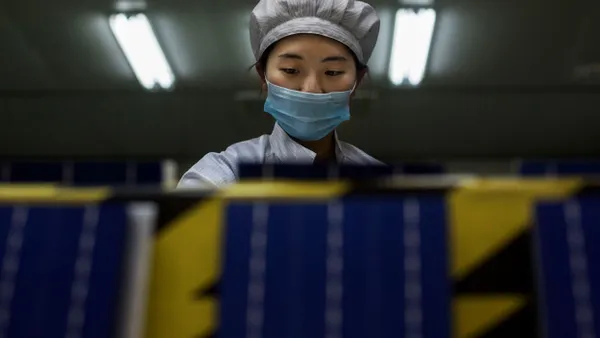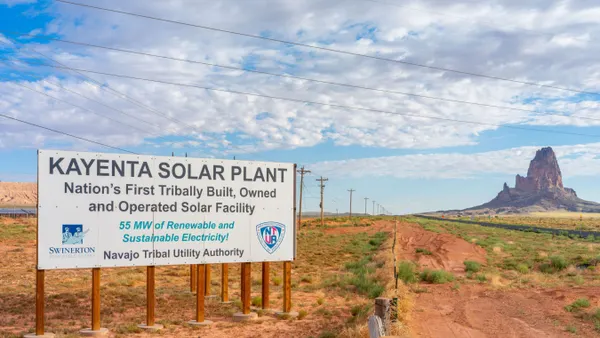Dive Brief:
- The U.S. International Trade Commission voted 4-0 on Friday to find that imports of cheap solar panels have caused injury to domestic solar manufacturers, setting up a high-stakes tariff decision for President Trump.
- The ITC sided with two financially struggling U.S. manufacturers who blamed cheap Chinese solar module imports for their demise. Suniva and SolarWorld propose a tariff of $0.40/watt on imported solar cells and a floor price of $0.78/watt on imported modules.
- The ITC has until November to make formal recommendations to the White House, after which Trump has two months to decide on a final policy. Tariff opponents say the manufacturer proposal could endanger 88,000 jobs and put at risk two-thirds of utility-scale solar projects set to come online in the next five years.
Dive Insight:
The ITC's finding puts the future of the U.S. solar industry into the hands of the Trump administration. With the injury ruling, the case now proceeds to the remedy phase, where the opposing sides will debate potential solutions before the ITC submits a formal recommendation to the White House.
SEIA expressed disappointment in the ruling in a call with journalists following the ruling.
"As you can imagine we are disappointed in today’s ITC votes but certainly not deterred," SEIA President Abigail Hopper said. "We will continue to take the leadership role" in these discussions, she added. "In the next five days, we’re going to be deeply engaged in thinking about remedies." Pre-hearing briefs for the remedy hearing are due Sept. 27.
Suniva, on the other hand, expressed relief over the ruling.
"We brought this action because the U.S. solar manufacturing industry finds itself at the precipice of extinction at the hands of foreign market overcapacity," the company said in a press statement. "The ITC has agreed, and now it will be in President Trump's hands to decide whether America will have this capability to manufacture this energy source."
The tariff petition comes as module prices fell dramatically, stoking demand in the U.S. by nearly 350%, according to a post-hearing brief from SolarWorld. During a marathon 10-hour hearing in August, Suniva and SolarWorld said nearly 30 solar manufacturers went under as a result of a flood of cheap Chinese solar modules, which were heavily subsidized by the government.
Opponents argued the two companies are not representative of the wider industry and have less of a stake in the U.S. than they claim.
An E&E News investigation uncovered the majority of Suniva's products were not made in the U.S., but came from other countries. The company sold a 64% stake to Chinese firm Shunfeng in 2015. SolarWorld's parent company is based in Germany as well, which filed for insolvency in May. Suniva declared Chapter 11 bankruptcy in April.
If President Trump approves the petitioners' tariff request, the solar lobby says impacts on deployment would be immense. Trump's political appointees have pledged support of coal generation, and the President himself decried solar as "too expensive" during his 2016 campaign. The ramifications for solar are significant, as the injury ruling injects uncertainty into solar developers' calculations and birthing wariness from lenders.
Without tariffs, GTM and SEIA forecast cumulative U.S. solar installations from 2018 to 2022 would be 72.5 GW. With a $0.78/watt minimum module price, that forecast falls to 36.4 GW. Add in the $0.40/watt cell tariff, and the forecast reaches only 25 GW over that time.
Some solar manufacturers could stand to benefit from the ruling, such as First Solar, which uses thin-film panels instead the crystalline silicon photovoltaic material. And foreign solar manufacturers said they are exploring options to open new facilities in the U.S. to avoid potential trade restrictions, Greentech Media reports.
A hearing to discuss remedies is set for Oct. 3. Recommendations are due to the White House by Nov. 13.
Editor's note: The post has been updated to include reactions from SEIA and Suniva.













